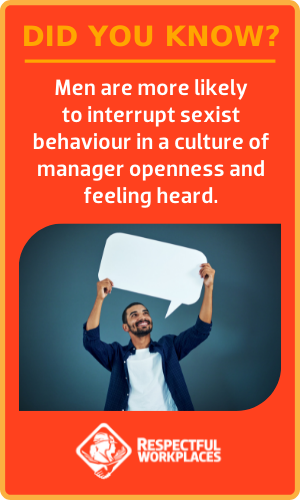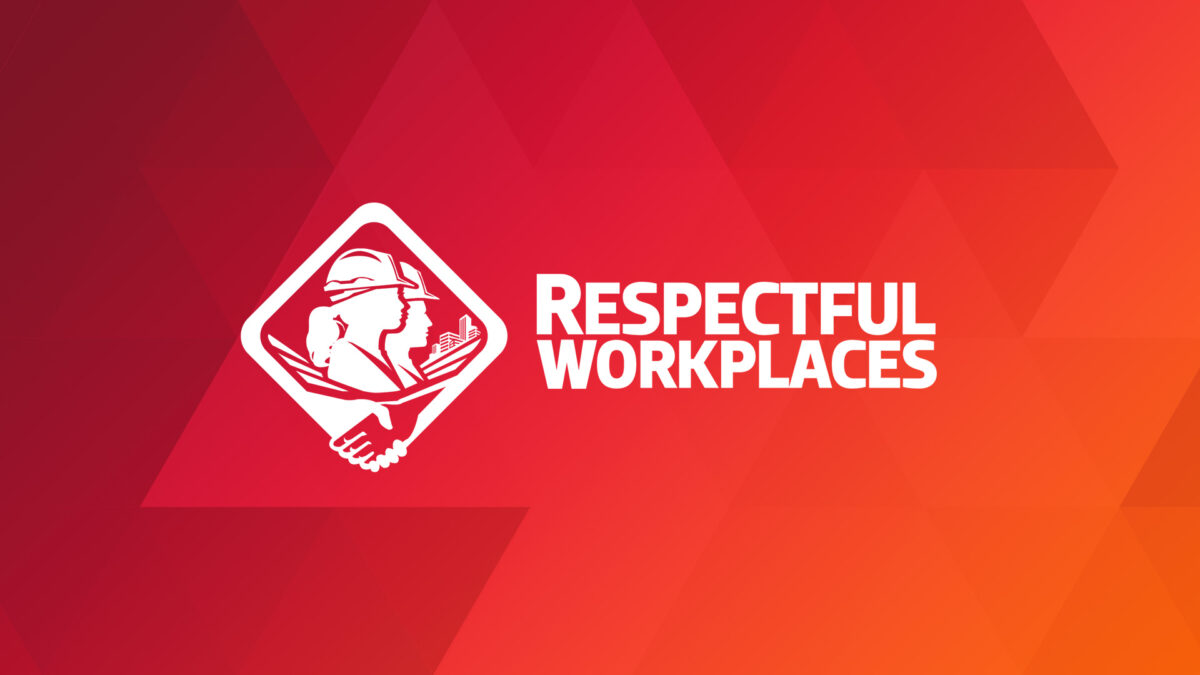Does your organization help leaders and managers to create a climate of manager openness and feeling heard?

Many organizations around the world are working to address bias, stereotypes, and discrimination toward women, yet progress is slow. Our readers will remember that the root of the difficulty in reaching gender parity lies not only in identifying how bias, stereotypes, and discrimination may be influencing people processes but also in re-working those systems to interrupt or reduce gender bias. (See blog #60 for an in-depth discussion.)
However, bias and stereotypes are also expressed in the day-to-day interactions between individuals in the form of jokes, comments, and behaviours. These behaviours are often spur of the moment, subtle, hidden in a joke, or spoken amongst an in-group, but overheard by others. Formal policies and procedures may not be sufficient to interrupt them, and instead rely on the intervention of those present to interrupt and discourage them.
Bias and stereotypes are the foundations of sexism. It rationalizes the discrimination, mistreatment, and objectification of people based on their sex, gender or sexual orientation. Sexism can take different forms. Overt sexism is intentional, visible, and unambiguous. With covert sexism, incidences are subtle, hidden in jokes, or spoken and quickly passed over, but nevertheless can have physical and psychological effects that undermine efforts to create an inclusive workplace.
Sexist comments and behaviours are a reality for most women. In a 2019 European study of more than 5,000 women in five countries, researchers found that 46% experienced sexism in their workplace at least once in the past year, and of those, 26% experienced it repeatedly. This included being exposed to whistling, rude gestures, or comments or suggestive looks.
Statistics Canada found that 25% of women said that they had been personally targeted with sexualized behaviours in their workplace. However, the researchers also found that almost half (47%) of women working in occupations historically dominated by men, such as trades, transportation, equipment operation, and related occupations, experienced these behaviours at work in the past year.
Men are uniquely situated to interrupt sexism, as they represent 50% of the global population and maintain the majority of leadership and power positions. It’s essential that they participate in the work of interrupting sexism.
Men can be powerful allies, but a “speak-up” climate in the workplace is required
Men can be powerful allies to call out colleagues who exhibit sexist behaviour. However, research has shown that many men espouse commitment to gender equality privately. They express anger at the possibility that their mothers, wives, and daughters might be treated unfairly, harassed, or assaulted, but when they witness sexism in the workplace, many will not act.
In a study by Catalyst, researchers found that the overwhelming majority of men (86%) say they are personally committed to interrupting sexist behaviours when they see them in the workplace, but only 31% feel confident that they can effectively speak up. The study found that for many men, the costs of calling out a colleague are associated with an organizational climate of silence that punishes those who speak up.
A climate of silence is an environment in which workers feel restrained from constructively speaking up about organizational or work-related problems, concerns, or challenges. Whether or not this climate of silence is created intentionally, it disables men from becoming agents of change. When speaking up is not encouraged by those who hold power in organizations, men are more likely to remain quiet, behave passively, or react in unconstructive ways when witnessing sexist behaviour.
Furthermore, a climate of silence flourishes when there is a sense of unease and fear that people who speak up will be penalized. As organizational silence increased, men were 50% less likely to be committed to interrupting sexism and 40% less likely to be confident in their ability to do so.
In a follow-up study, Catalyst found that a determining factor in assisting men to interrupt sexist behaviour is a “speak-up” climate of manager openness to hearing their ideas and that, more broadly, whether they feel heard in their workplace. Overall, 62% of men who experience high levels of manager openness say that they would likely directly interrupt a sexist comment compared to only 35% of men who report low levels of manager openness.
Manager openness is defined as the quality of showing interest in and acting upon employee ideas, views, and suggestions. In a speak-up climate, men are twice as likely to feel heard at work, and men who feel heard are in turn almost twice as likely to say that they would directly interrupt a sexist comment. Feeling heard is the belief that your views about your job and workplace are considered in decision making, by your manager and the organization in general.
How to create manager openness
There are skills and behaviours that leaders and managers can develop to help workers to:
Feel seen:
- Be totally present when interacting with your team; avoid multi-tasking and distractions.
- Sharpen your observation and active listening skills by paying attention to what workers are saying, what they are not saying, and body language and facial expressions.
Feel understood:
- Listen to understand an issue from your colleague’s point of view, instead of thinking about your response.
- Strive to relate to the situation at hand by being inquisitive and asking questions to better understand and assess the situation.
Feel supported:
- Practice empathy by seeking to understand your colleague’s experience, even if it is different from your own.
- Offer support by asking what they need, instead of assuming that you know.
Feel safe:
- Create an environment that feels psychologically safe, where people feel free to speak up and take risks without fear of repercussions.
- Make your availability known repeatedly. Some workers may need to hear the invitation more than once before accepting.
- Make invitations to talk free of pressure. It should be acceptable and safe for workers to decline the invitation and to share as much or as little as they want.
A workplace climate of openness where workers feel heard contributes to a speak-up climate that empowers men to interrupt sexist comments and behaviours. The support of men in the day-to-day work environment will be a significant factor in helping organizations to address bias, stereotypes, and discrimination.
Leaders and managers who are committed to creating workplaces where workers know that their ideas, views, and suggestions are valued should consider taking the Working in a Respectful and Inclusive Workplace online course. It provides information on creating a workplace where everyone feels welcome and supported.
The BuildForce Respectful and Inclusive Workplace Toolkit provides a suite of tools based on the proven practices of respectful and inclusive organizations:
- Online Self-Assessment Tool
- Policy Framework and Implementation Guide
- Working in a Respectful and inclusive Workplace online course
- Introduction to Understanding Systemic Racism – A Guide for Leaders and Managers online course
For more info:
- Burczycka, Marta. “Workers’ experiences of inappropriate sexualized behaviours, sexual assault and gender-based discrimination in the Canadian provinces, 2020.” Canadian Centre for Justice and Community Safety Statistics. August 12, 2021. Statistics Canada. See www150.statcan.gc.ca/n1/pub/85-002-x/2021001/article/00015-eng.htm.
- Sattari, Negin, Sarah DiMuccio and Ludo Gabriele. “When Managers Are Open, Men Feel Heard and Interrupt Sexism.” Catalyst. See www.catalyst.org/reports/managers-openness-sexism.
- Interrupting Sexism at Work: How Men Respond in a Climate of Silence. June 9, 2020. Catalyst. See www.catalyst.org/research/interrupting-sexism-silence.
- European Observatory on sexism and sexual harassment at work. (2019). Fondation Jean-Jaurès and the Foundation for European Progressive Studies. PowerPoint presentation. See www.feps-europe.eu/attachments/publications/116268_rapport_feps-fjj_uk.pdf.
- Smith, David G. and W. Brad Johnson. “Lots of Men are Gender-Equality Allies in Private. Why Not in Public?” Harvard Business Review. October 13, 2017. See https://hbr.org/2017/10/lots-of-men-are-gender-equality-allies-in-private-why-not-in-public.
- World Economic Forum. Global Gender Gap Report 2021. See www.weforum.org/reports/global-gender-gap-report-2021.
Read from the beginning. Click here to start at Part 1.
What can an effective Respectful and Inclusive Workplace Program deliver?
- Become an employer of choice – attract, retain, and advance top talent from all sources of labour
- Unlock collaboration and innovation – create high-performing teams through diversity of thought and experience
- Build your brand – your organization will gain a competitive edge as a leader and innovator
Get started today!
The BuildForce Canada Online Respectful and Inclusive Workplace Toolkit includes:
- the Respectful Workplace Online Self-Assessment Tool to assist organization leadership in assessing their current situation and identifying where they may need to make changes
- the Respectful Workplace Policy Framework and Implementation Guide to assist organizations in creating and implementing a policy that supports a respectful and inclusive workplace
- the Respectful Workplace Online Training Course to train workers on how to create and support a respectful and inclusive workplace
- the online course Introduction to Understanding Systemic Racism: A Guide for Leaders and Managers
All the resources you need to create and support a respectful and inclusive workplace!

Respectful and Inclusive Workplaces
